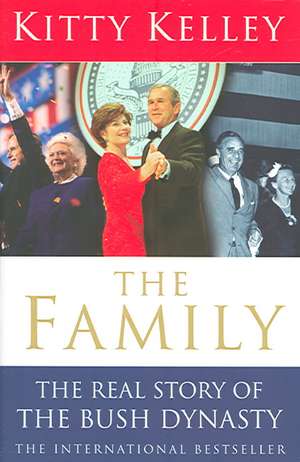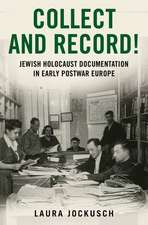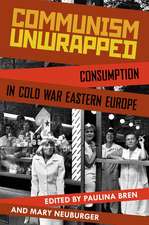The Family: The Real Story of the Bush Dynasty. Kitty Kelley
Autor Kitty Kelleyen Limba Engleză Paperback – mai 2005
| Toate formatele și edițiile | Preț | Express |
|---|---|---|
| Paperback (2) | 122.96 lei 3-5 săpt. | +25.39 lei 6-12 zile |
| PENGUIN RANDOM HOUSE LLC – mai 2005 | 122.96 lei 3-5 săpt. | +25.39 lei 6-12 zile |
| Anchor Books – 30 apr 2005 | 151.01 lei 3-5 săpt. |
Preț: 122.96 lei
Nou
Puncte Express: 184
Preț estimativ în valută:
23.53€ • 24.62$ • 19.55£
23.53€ • 24.62$ • 19.55£
Carte disponibilă
Livrare economică 13-27 martie
Livrare express 26 februarie-04 martie pentru 35.38 lei
Preluare comenzi: 021 569.72.76
Specificații
ISBN-13: 9780553814231
ISBN-10: 0553814230
Pagini: 875
Ilustrații: Illustrations, ports.
Dimensiuni: 134 x 199 x 45 mm
Greutate: 0.62 kg
Ediția:Revised
Editura: PENGUIN RANDOM HOUSE LLC
Locul publicării:United Kingdom
ISBN-10: 0553814230
Pagini: 875
Ilustrații: Illustrations, ports.
Dimensiuni: 134 x 199 x 45 mm
Greutate: 0.62 kg
Ediția:Revised
Editura: PENGUIN RANDOM HOUSE LLC
Locul publicării:United Kingdom
Notă biografică
Kitty Kelley is the internationally acclaimed bestselling author of Jackie Oh!; Elizabeth Taylor: The Last Star; His Way: The Unauthorized Biography of Frank Sinatra; Nancy Reagan: The Unauthorized Biography; and The Royals. The last three titles were all #1 on the New York Times bestseller list. Ms. Kelley has been honored by her peers with such awards as the Outstanding Author Award from the American Society of Jouranlists and Authors, the Philip M. Stern Award, and the Medal of Merit from the Lotos Club of New York City. Her articles have appeared in the New York Times, the Washington Post, the Wall Street Journal, Newsweek, People, Ladies Home Journal, McCall’s, the Los Angeles Times, and the Chicago Tribune. She lives in Washington, D.C., with her physician husband, Jonathan Zucker.
Extras
CHAPTER ONE
Flora Sheldon Bush was fuming. Her thirteen-year-old son, Prescott, was supposed to have spent that August of 1908 at a New Jersey sports resort with a classmate and his family. Flora's husband, Samuel Prescott Bush, had sent the boy there to play tennis, while Flora, their two daughters, Mary and Margaret, their younger son, Jim, Samuel's mother, Harriet, and the family nanny were spending the month at the East Bay Lodge in Osterville, Massachusetts. But Prescott had abruptly been sent home by his friend's mother, Mrs. Dods. Flora's regal mother-in-law, Harriet Fay Bush, urged her to demand an explanation and an apology from Mrs. Dods, but Flora, whose social instincts were unerring in these matters, restrained herself. "I am not ready for that," she wrote to her husband. "I think I may hear from Mrs. D. and if so, you must forward the letter . . . for nothing has ever happened that raised my indignation more than her summary dismissal of Prescott."
A few days later Flora again mentioned her vexation: "Your mother is quite sure I ought to write Mrs. Dods. It scarcely seems right. I resent it all more than anything I have experienced."
The unexpected change in Prescott's plans upset his father, who worried that the incident might have been Prescott's fault. If so, that might affect his acceptance into St. George's School in the fall. But after hearing her son's side of the story, Flora tried to assure her husband that the youngster was not entirely to blame:
I am sorry you are disappointed in Prescott and yet I am not surprised. He is of course a boy of very tender years. And I sometimes have a feeling of great dread at sending him away to school and yet I do feel that the strict discipline may be just the thing. He was glad to get back to us again but he misses his sport at Osterville--There are no tennis courts here but poor grass ones--he said if he had his clubs he would play golf.
The matter of Prescott's departure was finally cleared up when Samuel telegrammed Flora that the much-maligned Mrs. Dods had indeed written to explain herself. Samuel forwarded the letter from Ohio, and Flora was almost comforted to learn that Mrs. Dods had taken ill in New Jersey. "It was the only excuse I could possibly have accepted," she wrote. "Her letter was as satisfactory as anything could be + while I do not justify the haste I at least can appreciate her anxiety to get rid of the young company--as summer cottages are not the quiet hospitals one needs in case of illness."
A few days later, Prescott received his golf clubs. And Samuel must have been somewhat reassured to receive a letter from his seventy-nine-year-old mother extolling the teenager, if not without reservation:
I was much impressed with Prescott's appearance and manner as he jumped out of the carriage + came to speak to me--he is a handsome boy + a well developed figure for [illegible] growth. I trust the time will soon come when he will--if I can use the word--slough off the pernicious habit of fooling. If I had not seen its results in Aunt Virginia's family perhaps it would not seem to be so fraught with danger, but with you and Flora to guard him and the uniform discipline of a school he will doubtless find its disadvantages himself. It makes friends with the boys but antagonizes the teachers as I also know by personal experience but little can be done except . . . protect him until he is wise enough to check it.
Grandmother Bush was more perceptive than perhaps even she could have realized. Her grandson's "pernicious habit of fooling" was something that would remain with him for years. At times, the result would be humorous; at other times, there would be serious repercussions.
Prescott could simply not be suppressed. He possessed all the precocious gifts of a firstborn son who was indulged and adored by his parents. He had inherited humor, dramatic flair, and sociability from his mother, while he exhibited his father's height, good looks, and graceful athleticism. The surprising effect of her "splendid boy" was not lost on Flora. "I have had one new experience," she wrote to her husband, "and that is the devotion of girls 18 or 19 years old to Prescott. He is having a charming time dancing with them + going swimming + indeed walking or running. Prescott + one or two boys a little older are all the boys there are + you may imagine their popularity. I shall be glad to have him away from the girls. He is very kind to me + indeed to us all--but--of course, being in such demand for any length of time might turn his head."
Even his grandmother's efforts could not rein him in, and she was someone to be reckoned with. Already widowed for nineteen years when she wrote the note analyzing Prescott, Harriet Fay Bush was born in Savannah, Georgia, of illustrious ancestors who fertilized the family tree with connections to British royalty. On occasion Mrs. Bush could be as starchy as Queen Victoria, but Flora loved her mother-in-law and fussed about the elderly woman's frailty. "I wonder how she keeps up at all," Flora wrote. "She has had so many wretched days + people tire and annoy her so very much that I have felt a number of times that it was almost too much for her."
Flora need not have worried. Behind that swansdown fan fluttered a steel magnolia who would outlast most of her relatives, including her daughter-in-law. As sturdy as the kudzu of Georgia, Harriet Fay Bush would live to be ninety-four years old.
During the summer of 1908, the Bushes were completing a two-and-a-half-story colonial-style seventeen-room home on Roxbury Road overlooking the bluff of Marble Cliff in Columbus, Ohio. They had purchased the 2.7-acre site for $12,500 the year before, and their letters were filled with details of the seven-bayed windows, five dormered bedrooms, upstairs ballroom, cedar-lined storage room, and awninged porch atop the first-floor sunroom.
"I still remember that house, and I'm ninety-five now," recalled Indiana Earl in 2001. "Of course, it was fitting for Samuel Bush to live there because he was extremely wealthy and viewed with enormous respect in the community. The Bushes' big white house sat at the top of a hill looking down on a marble quarry across the street from Sylvio Casparis's castle . . . Mr. Bush was well-to-do wealthy but not as really rich as old Mr. Casparis, who owned the Marble Cliff Quarries."
As the daughter of a prominent dry-goods merchant, Flora understood how to run a fine home and was delighted when her husband, the president of the Buckeye Steel Castings Company as well as one of the founders of the Scioto Country Club of Columbus, bought land in Grandview Heights near where her brothers and sisters were building their large homes. Flora oversaw the architectural plans for the new house and attended to the details of paying various merchants. "This bill of Sargents is a terror," she wrote. "Certainly changing those panes is pretty expensive." Her letters brimmed with eagerness to see the construction completed in time for her family to move in the fall. "We shall all be together and be so very happy," she put in one of her notes.
In an era before such modern conveniences as washing machines and dryers, Flora expressed concern for a satisfactory cellar that would be "clean and nice and serve as an excellent drying room for laundry." She acceded to her husband's love of flowers and his desire for larger gardens to accommodate more plantings, but insisted on her own way in other areas. "About the fireplace--it must be done," she wrote. "There is no doubt about it. I am willing to compromise on the red. My only choice has been a suitable brown and if that cannot be found I shall certainly never give you cause to regret the red."
As pleased as Flora was to be at Cape Cod with her children and away from the noisy builders and summer heat of the Midwest, she missed her forty-four-year-old husband, who was known to intimates by his middle name. She began each letter with loving salutations such as "My Dear Prescott" or "My Dearest Boy." Irrepressibly affectionate at the age of thirty-six, she signed off with endearments such as "Adieu, my darling Boy," "I love you my darling and am thinking of you constantly," "I love you sweetheart dearly. Don't get on too well without me," "Please miss me a little, my dearest."
Nor was she coy about her desire for the man she called "Bushy." In one letter she wrote:
I should like to have you down here fore [sic] a week after every one has gone--+ we should lead an Adam + Eve existence--bathe and roam about--We could have a very happy time near to nature's heart . . . I so seldom see a person I desire for a friend. Of course it is because you + I are so much to each other. We do not need the others--I surely need little dear when I am sure of you--but it is the most vital thing in the world that you stay by me.
She also wrote about her own pleasure at "bathing," especially on the rare days she dared to ditch her petticoats, whalebone collars, and fishnet hose. One day, she said, was absolutely perfect because "we went in without skirts or stockings and the sensation was delightful." And Flora burbled on about the children's swimming lessons: "Such progress as they are making is truly delightful. Diving or rather jumping into the water and swimming right off--it is fine--I would give anything to have that love for the water or rather the faith--for I do love it--but to be without fear--there is nothing like it."
Flora seemed quite ready to leave behind the nineteenth-century discomforts of carriages and embrace the new invention of the automobile. As she wrote to her husband, "There is only one comfortable way to get about and that is in a motor car--such a vastly cleaner mode of travel in this part." That was the year Henry Ford introduced his Model T, which sold for $850.
Flushed with the good fortune of her life, Flora took nothing for granted, especially after she had a frightening accident one morning:
A baseball flying with terrific force, having been batted 50 or 75 feet away, struck me just over the left eye. I dropped + was dazed but soon came to my senses--Prescott white as a sheet + others helping me up--I was able to walk over + then had applications + things done--but I have had a horrid day--as I am lame everywhere + my poor head feels as though it was not mine. Excepting that it hurts. It is turning a hideous green + blue. I suppose I ought to be brave + not write you but my dear Boy I have to let you know. It takes my breath when I realize how easily I might have been killed or my eye put out or anything.
Days later, she wrote: "My head is getting back to its normal state again, but my eye is a hideous black + blue, but I do not suffer. I can't help feeling thankful when I think of the narrow escape."
On her last day at Osterville, she wrote that she was looking forward to returning to Ohio to see their new home: "I am still giving thanks--just think I might never have seen the bay window had the ball struck half an inch lower. I am very thankful to have gotten off so well."
By the Cape Cod summer of 1908, Flora and Samuel had been married fourteen years and had four surviving children. They had endured the death of their second child, Robert Sheldon Bush, in 1900. He was three and a half years old when he contracted scarlet fever, which he fought for six weeks until his little kidneys gave out. He was cremated and his ashes reposed in the Forest Home Cemetery in Milwaukee, Wisconsin, where the Bushes had lived for two years. They never specifically mention that sadness in the correspondence that survives. In one letter Samuel alludes to "hard things to bear" and shows he is grounded in the biblical principle that human beings grow in grace only by overcoming adversity. "We should be wonderfully happy," he wrote. "We are and we will be . . . but surely we should not care to have our lives easy. There would be no accomplishment, no development. We must meet the difficult things and by mutual help surmount them."
Long before women got the vote and feminists looked like troublemakers in lace bonnets, Samuel Bush had accepted his wife as his equal. His letters to her sound as emancipated as those John Adams wrote to Abigail in the eighteenth century:
You speak of the father as the governing power and very lovingly, too, but my idea is that while the father may be the governing power in some things, the mother is quite as much so in other things and that the power is a dual one and so intended by its creator and it has always been my desire to so have it and so I wish to have you on equal terms and then by mutual consideration have our marriage and love complete and fruitful of the best.
These letters, saved by Samuel and bequeathed to his heirs, reveal a vibrant partnership between parents who loved their children abundantly and cared for their welfare, although, truth to tell, they write more of their two sons, Prescott and James, than of their two daughters, Mary and Margaret. In her letters, Flora jumps off the page in vivid color as she whirls among her various roles of caring daughter-in-law, nurturing mother, solicitous wife, and robust lover.
With her summer coming to a close, Flora made arrangements for the family to return to Ohio by train, the most comfortable means of travel in those days. "I have applied for sleeping car accomodations so that we will surely get berths . . . and have one Drawing Room."
She told her husband that their oldest child was more than ready to leave Douglas Elementary School in Columbus and start the all-boys preparatory school of St. George's in Newport, Rhode Island:
Prescott is quite a beaux [sic] and I shall be very well satisfied to have him safely under Mr. Diman's care--the strict discipline is just the thing I agree in believing in discipline. You must be sure to arrange to go on with Prescott about the 20th as it is most necessary that you see his surroundings, meet the masters + feel satisfied about the whole.
From the Hardcover edition.
Flora Sheldon Bush was fuming. Her thirteen-year-old son, Prescott, was supposed to have spent that August of 1908 at a New Jersey sports resort with a classmate and his family. Flora's husband, Samuel Prescott Bush, had sent the boy there to play tennis, while Flora, their two daughters, Mary and Margaret, their younger son, Jim, Samuel's mother, Harriet, and the family nanny were spending the month at the East Bay Lodge in Osterville, Massachusetts. But Prescott had abruptly been sent home by his friend's mother, Mrs. Dods. Flora's regal mother-in-law, Harriet Fay Bush, urged her to demand an explanation and an apology from Mrs. Dods, but Flora, whose social instincts were unerring in these matters, restrained herself. "I am not ready for that," she wrote to her husband. "I think I may hear from Mrs. D. and if so, you must forward the letter . . . for nothing has ever happened that raised my indignation more than her summary dismissal of Prescott."
A few days later Flora again mentioned her vexation: "Your mother is quite sure I ought to write Mrs. Dods. It scarcely seems right. I resent it all more than anything I have experienced."
The unexpected change in Prescott's plans upset his father, who worried that the incident might have been Prescott's fault. If so, that might affect his acceptance into St. George's School in the fall. But after hearing her son's side of the story, Flora tried to assure her husband that the youngster was not entirely to blame:
I am sorry you are disappointed in Prescott and yet I am not surprised. He is of course a boy of very tender years. And I sometimes have a feeling of great dread at sending him away to school and yet I do feel that the strict discipline may be just the thing. He was glad to get back to us again but he misses his sport at Osterville--There are no tennis courts here but poor grass ones--he said if he had his clubs he would play golf.
The matter of Prescott's departure was finally cleared up when Samuel telegrammed Flora that the much-maligned Mrs. Dods had indeed written to explain herself. Samuel forwarded the letter from Ohio, and Flora was almost comforted to learn that Mrs. Dods had taken ill in New Jersey. "It was the only excuse I could possibly have accepted," she wrote. "Her letter was as satisfactory as anything could be + while I do not justify the haste I at least can appreciate her anxiety to get rid of the young company--as summer cottages are not the quiet hospitals one needs in case of illness."
A few days later, Prescott received his golf clubs. And Samuel must have been somewhat reassured to receive a letter from his seventy-nine-year-old mother extolling the teenager, if not without reservation:
I was much impressed with Prescott's appearance and manner as he jumped out of the carriage + came to speak to me--he is a handsome boy + a well developed figure for [illegible] growth. I trust the time will soon come when he will--if I can use the word--slough off the pernicious habit of fooling. If I had not seen its results in Aunt Virginia's family perhaps it would not seem to be so fraught with danger, but with you and Flora to guard him and the uniform discipline of a school he will doubtless find its disadvantages himself. It makes friends with the boys but antagonizes the teachers as I also know by personal experience but little can be done except . . . protect him until he is wise enough to check it.
Grandmother Bush was more perceptive than perhaps even she could have realized. Her grandson's "pernicious habit of fooling" was something that would remain with him for years. At times, the result would be humorous; at other times, there would be serious repercussions.
Prescott could simply not be suppressed. He possessed all the precocious gifts of a firstborn son who was indulged and adored by his parents. He had inherited humor, dramatic flair, and sociability from his mother, while he exhibited his father's height, good looks, and graceful athleticism. The surprising effect of her "splendid boy" was not lost on Flora. "I have had one new experience," she wrote to her husband, "and that is the devotion of girls 18 or 19 years old to Prescott. He is having a charming time dancing with them + going swimming + indeed walking or running. Prescott + one or two boys a little older are all the boys there are + you may imagine their popularity. I shall be glad to have him away from the girls. He is very kind to me + indeed to us all--but--of course, being in such demand for any length of time might turn his head."
Even his grandmother's efforts could not rein him in, and she was someone to be reckoned with. Already widowed for nineteen years when she wrote the note analyzing Prescott, Harriet Fay Bush was born in Savannah, Georgia, of illustrious ancestors who fertilized the family tree with connections to British royalty. On occasion Mrs. Bush could be as starchy as Queen Victoria, but Flora loved her mother-in-law and fussed about the elderly woman's frailty. "I wonder how she keeps up at all," Flora wrote. "She has had so many wretched days + people tire and annoy her so very much that I have felt a number of times that it was almost too much for her."
Flora need not have worried. Behind that swansdown fan fluttered a steel magnolia who would outlast most of her relatives, including her daughter-in-law. As sturdy as the kudzu of Georgia, Harriet Fay Bush would live to be ninety-four years old.
During the summer of 1908, the Bushes were completing a two-and-a-half-story colonial-style seventeen-room home on Roxbury Road overlooking the bluff of Marble Cliff in Columbus, Ohio. They had purchased the 2.7-acre site for $12,500 the year before, and their letters were filled with details of the seven-bayed windows, five dormered bedrooms, upstairs ballroom, cedar-lined storage room, and awninged porch atop the first-floor sunroom.
"I still remember that house, and I'm ninety-five now," recalled Indiana Earl in 2001. "Of course, it was fitting for Samuel Bush to live there because he was extremely wealthy and viewed with enormous respect in the community. The Bushes' big white house sat at the top of a hill looking down on a marble quarry across the street from Sylvio Casparis's castle . . . Mr. Bush was well-to-do wealthy but not as really rich as old Mr. Casparis, who owned the Marble Cliff Quarries."
As the daughter of a prominent dry-goods merchant, Flora understood how to run a fine home and was delighted when her husband, the president of the Buckeye Steel Castings Company as well as one of the founders of the Scioto Country Club of Columbus, bought land in Grandview Heights near where her brothers and sisters were building their large homes. Flora oversaw the architectural plans for the new house and attended to the details of paying various merchants. "This bill of Sargents is a terror," she wrote. "Certainly changing those panes is pretty expensive." Her letters brimmed with eagerness to see the construction completed in time for her family to move in the fall. "We shall all be together and be so very happy," she put in one of her notes.
In an era before such modern conveniences as washing machines and dryers, Flora expressed concern for a satisfactory cellar that would be "clean and nice and serve as an excellent drying room for laundry." She acceded to her husband's love of flowers and his desire for larger gardens to accommodate more plantings, but insisted on her own way in other areas. "About the fireplace--it must be done," she wrote. "There is no doubt about it. I am willing to compromise on the red. My only choice has been a suitable brown and if that cannot be found I shall certainly never give you cause to regret the red."
As pleased as Flora was to be at Cape Cod with her children and away from the noisy builders and summer heat of the Midwest, she missed her forty-four-year-old husband, who was known to intimates by his middle name. She began each letter with loving salutations such as "My Dear Prescott" or "My Dearest Boy." Irrepressibly affectionate at the age of thirty-six, she signed off with endearments such as "Adieu, my darling Boy," "I love you my darling and am thinking of you constantly," "I love you sweetheart dearly. Don't get on too well without me," "Please miss me a little, my dearest."
Nor was she coy about her desire for the man she called "Bushy." In one letter she wrote:
I should like to have you down here fore [sic] a week after every one has gone--+ we should lead an Adam + Eve existence--bathe and roam about--We could have a very happy time near to nature's heart . . . I so seldom see a person I desire for a friend. Of course it is because you + I are so much to each other. We do not need the others--I surely need little dear when I am sure of you--but it is the most vital thing in the world that you stay by me.
She also wrote about her own pleasure at "bathing," especially on the rare days she dared to ditch her petticoats, whalebone collars, and fishnet hose. One day, she said, was absolutely perfect because "we went in without skirts or stockings and the sensation was delightful." And Flora burbled on about the children's swimming lessons: "Such progress as they are making is truly delightful. Diving or rather jumping into the water and swimming right off--it is fine--I would give anything to have that love for the water or rather the faith--for I do love it--but to be without fear--there is nothing like it."
Flora seemed quite ready to leave behind the nineteenth-century discomforts of carriages and embrace the new invention of the automobile. As she wrote to her husband, "There is only one comfortable way to get about and that is in a motor car--such a vastly cleaner mode of travel in this part." That was the year Henry Ford introduced his Model T, which sold for $850.
Flushed with the good fortune of her life, Flora took nothing for granted, especially after she had a frightening accident one morning:
A baseball flying with terrific force, having been batted 50 or 75 feet away, struck me just over the left eye. I dropped + was dazed but soon came to my senses--Prescott white as a sheet + others helping me up--I was able to walk over + then had applications + things done--but I have had a horrid day--as I am lame everywhere + my poor head feels as though it was not mine. Excepting that it hurts. It is turning a hideous green + blue. I suppose I ought to be brave + not write you but my dear Boy I have to let you know. It takes my breath when I realize how easily I might have been killed or my eye put out or anything.
Days later, she wrote: "My head is getting back to its normal state again, but my eye is a hideous black + blue, but I do not suffer. I can't help feeling thankful when I think of the narrow escape."
On her last day at Osterville, she wrote that she was looking forward to returning to Ohio to see their new home: "I am still giving thanks--just think I might never have seen the bay window had the ball struck half an inch lower. I am very thankful to have gotten off so well."
By the Cape Cod summer of 1908, Flora and Samuel had been married fourteen years and had four surviving children. They had endured the death of their second child, Robert Sheldon Bush, in 1900. He was three and a half years old when he contracted scarlet fever, which he fought for six weeks until his little kidneys gave out. He was cremated and his ashes reposed in the Forest Home Cemetery in Milwaukee, Wisconsin, where the Bushes had lived for two years. They never specifically mention that sadness in the correspondence that survives. In one letter Samuel alludes to "hard things to bear" and shows he is grounded in the biblical principle that human beings grow in grace only by overcoming adversity. "We should be wonderfully happy," he wrote. "We are and we will be . . . but surely we should not care to have our lives easy. There would be no accomplishment, no development. We must meet the difficult things and by mutual help surmount them."
Long before women got the vote and feminists looked like troublemakers in lace bonnets, Samuel Bush had accepted his wife as his equal. His letters to her sound as emancipated as those John Adams wrote to Abigail in the eighteenth century:
You speak of the father as the governing power and very lovingly, too, but my idea is that while the father may be the governing power in some things, the mother is quite as much so in other things and that the power is a dual one and so intended by its creator and it has always been my desire to so have it and so I wish to have you on equal terms and then by mutual consideration have our marriage and love complete and fruitful of the best.
These letters, saved by Samuel and bequeathed to his heirs, reveal a vibrant partnership between parents who loved their children abundantly and cared for their welfare, although, truth to tell, they write more of their two sons, Prescott and James, than of their two daughters, Mary and Margaret. In her letters, Flora jumps off the page in vivid color as she whirls among her various roles of caring daughter-in-law, nurturing mother, solicitous wife, and robust lover.
With her summer coming to a close, Flora made arrangements for the family to return to Ohio by train, the most comfortable means of travel in those days. "I have applied for sleeping car accomodations so that we will surely get berths . . . and have one Drawing Room."
She told her husband that their oldest child was more than ready to leave Douglas Elementary School in Columbus and start the all-boys preparatory school of St. George's in Newport, Rhode Island:
Prescott is quite a beaux [sic] and I shall be very well satisfied to have him safely under Mr. Diman's care--the strict discipline is just the thing I agree in believing in discipline. You must be sure to arrange to go on with Prescott about the 20th as it is most necessary that you see his surroundings, meet the masters + feel satisfied about the whole.
From the Hardcover edition.
Recenzii
"This is a story of power, sex and betrayal--but mostly of power." –The New York Times Book Review
"A thoroughly researched piece of work. Ms. Kelley clearly devoured and digested the extant literature on the family." –The New York Times
"Kelley's account of the rise and fall of the Bush family is both inspirational and cautionary. She convincingly shows that good looks, energy, athleticism, ambition, felicitous marriages and social networking can compensate for intellectual ordinariness." –The Washington Post Book World
"The Family . . . has left few stones unturned. . . . Kelley has brought new information to bear on a family that, for better or worse, deserves her kind of royal treatment." –The New York Times Book Review
"A sweeping indictment of the mind-set of the [Bush] family, that they grew up feeling that this was their due." –Garry Trudeau, The Charlie Rose Show
"Despite the best efforts of the media, the public is gaining insight into their president as the facts leak out and as Kitty Kelley's The Family: The Real Story of the Bush Dynasty, tops the sales chart." –Newsday
"Kelley nails the evidence and, although the secretive Bush family will not like it, demonstrates beyond doubt what the American press dared not print." –The Guardian
"A thoroughly researched piece of work. Ms. Kelley clearly devoured and digested the extant literature on the family." –The New York Times
"Kelley's account of the rise and fall of the Bush family is both inspirational and cautionary. She convincingly shows that good looks, energy, athleticism, ambition, felicitous marriages and social networking can compensate for intellectual ordinariness." –The Washington Post Book World
"The Family . . . has left few stones unturned. . . . Kelley has brought new information to bear on a family that, for better or worse, deserves her kind of royal treatment." –The New York Times Book Review
"A sweeping indictment of the mind-set of the [Bush] family, that they grew up feeling that this was their due." –Garry Trudeau, The Charlie Rose Show
"Despite the best efforts of the media, the public is gaining insight into their president as the facts leak out and as Kitty Kelley's The Family: The Real Story of the Bush Dynasty, tops the sales chart." –Newsday
"Kelley nails the evidence and, although the secretive Bush family will not like it, demonstrates beyond doubt what the American press dared not print." –The Guardian
Descriere
Descriere de la o altă ediție sau format:
As the Bush family has risen to dominance, so, too, they have been master orchestrators of their own public image, acting and operating under the shield of privacy their money and status have always afforded them--until now.
As the Bush family has risen to dominance, so, too, they have been master orchestrators of their own public image, acting and operating under the shield of privacy their money and status have always afforded them--until now.











